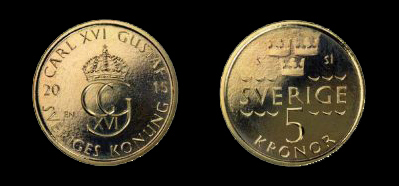Numismatic News | September 27, 2016 – Posted by Maggie Judkins | Article by Richard Giedroyc
This article was originally printed in World Coin News.
If you are holding Swedish kroner coins or bank notes, you might want to consider converting them while you still can. The Sveriges Riksbank or Swedish Royal Bank is quickly moving to a cashless society, making it as inconvenient as possible to convert its physical cash for anyone holding its currency outside of Sweden in the process.
Once Sweden completes the process of doing away with all of its coins and bank notes, it will become the first country anywhere to use an all-electronic system of payments. By so doing Sweden also opens the door for Big Brother to be watching every move of every citizen, as well as the potential abuses of a politician freezing the money of a political enemy or the citizenry at large on a moment’s notice.
A critical assessment of what Sweden is doing was written by International and U.S. foreign policy commentator Derek Monroe and appears in the July 15 Observer Politics.
According to Monroe, “The Riksbank has cheerfully posted the amount of money it deemed invalid. On August 30, 2016, 7.9 billion kroner (US$933 million) will become a collector’s item. In 2017 the largest bills (100s and 500s) and coins will also be history. By itself, the transaction would have been uncontroversial, as all bills and coins need updating from time to time due to improvements in printing, and manufacturing technologies that enable fraud. However, the Riksbank’s process is designed to completely invalidate all cash held overseas – thus making the process of exchanging it impossible.”
The Swedish central bank will require all 20-, 50- and 1,000-kroner bank notes to be sent to them by registered mail for conversion beginning Sept. 1. The bank has made no mention of the redemption of coins. No conversion can be made in person. The registered mail system works from anywhere within the European Union; however, it doesn’t work from elsewhere. U.S. registered mail is only accepted within the United States. Sending Swedish kroner to be converted at the central bank from the United States is going to be risky and expensive.
Furthermore, conversions will be made exclusively into electronic deposits, not cash. Banks in the United States and in most areas outside the EU don’t except kroner deposits. Electronic deposits will be converted, but will include a handling fee of 100 kroner (about US$11.86) and additional bank incoming transfer fees on a scale of $20 and up. There are also foreign exchange fees that are typically between two and six percent, depending on the individual bank.
According to Monroe, “The Swedish operation is specifically designed to limit kroner holdings overseas.”
Susanna Grufman is the supervisor of the Rijksbank department responsible for coins and notes. Grufman fired back, “Our aim is solely to increase security and efficiency in the use of cash. We do not agree that the changeover is being conducted at the expense of people holding Swedish bank notes but living overseas.”
Monroe’s comments don’t take coin collecting into account, but he makes good points regarding what a cashless Sweden will involve. According to Monroe, “The only reason for going cashless appears to be geopolitical and socio-economic. The move will increase bank profits by limiting their liabilities and costs of handling cash, while at the same time influencing the spending habits of the population by increasing debt. Politically the operation makes society much more susceptible to a central system of control as it erases any precept of individual privacy. How one spends their money is personal. Giving any entity the keys to that information – regardless of motive – presents instant and absolute control as the world has never seen.”
Monroe continues, “The operation is also symptomatic of careful planning for an uncertain future. As of June 2016 only 12 percent of Sweden’s gold reserves are held in the country. When the cash on hand dwindles to the point of Riksbank halting to the process of de-cashing Sweden, one can only wonder if the country is perceived as a front line in the upcoming conflict with Russia?”
At the moment Sweden’s cashless society is only an experiment; however, there are countries around the world that will consider following this example – if it works.



